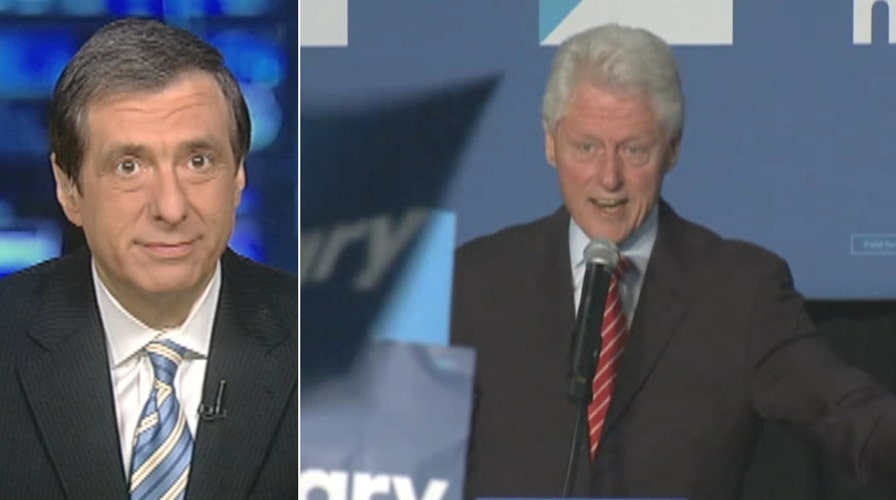Kurtz: Bill Clinton gets mad
'MediaBuzz' host reacts to Bill Clinton's heated exchange with Black Lives Matter activists
The pundits are having a field day beating up on Bill Clinton.
He’s off message, they say. He’s lost it. He’s trapped in the past. He’s hurting her campaign.
Here’s a contrary view: The former president did something the other day that his wife should do more of.
He was being heckled in Philadelphia by protestors from Black Lives Matter, and he decided to fight back.
Terrible idea, many commentators said. His wife is trying to get African-American votes. What’s he doing alienating a Democratic constituency group?
“Fire Bill Clinton,” demands Slate columnist Michelle Goldberg.
“I wonder if there’s a part of Bill Clinton that doesn't really want Hillary Clinton to become president, particularly if she has to distance herself from his legacy to do so. How else to explain why one of the world’s most talented and agile politicians is so consistently flat-footed and destructive when advocating on his wife’s behalf?”
What Clinton did was seize the moment, deliver an emotional response and tell a group of agitators something they didn’t want to hear.
That’s quite a contrast with the cautious candidate, whose public utterances seem so calculating and who rarely if ever challenges her supporters.
First, the back story. In 1994, when violent crime was a major issue, Clinton pushed through legislation that imposed harsher sentencing guidelines and provided funding for more prisons and for more police officers on the street. This was popular at the time--but has since been blamed for an explosion in incarceration that is a liability in the 2016 Democratic primaries.
Hillary Clinton vowed to reverse many of these policies last year, saying it is “time to end the era of mass incarceration.” And that’s fine: no reason she should be bound by what the 42nd president did more than two decades ago.
Her husband went along, saying the crime bill was a compromise that cast “too wide a net” and that “we have too many people in prison.”
Earlier this year, a black activist confronted Hillary about a comment she made about some hardened young criminals in 1996: “They are often the kinds of kids that are called 'super-predators.' No conscience, no empathy, we can talk about why they ended up that way, but first we have to bring them to heel.”
Clinton told the Washington Post after that meeting that she regretted having used those words.
But in Philadelphia last week, faced with such signs as “Hillary is a murderer,” Bill Clinton angrily defended his wife’s 20-year-old characterization.
“I don’t know how you would characterize the gang leaders who got 13-year-old kids hopped up on crack and sent them out on the street to murder other African-American children. Maybe you thought they were good citizens. She didn’t…You are defending the people who kill the people whose lives you say matter!”
Of course, Clinton also defended his legislation for slashing the crime rate, so maybe he was getting defensive about his administration’s record.
Still, it was a moment. Not unlike the Sister Souljah moment in 1992, when candidate Clinton took on a black rapper over her violent lyrics about killing white people.
A day later, he must have been told his scolding of the protestors was not playing well. “I almost want to apologize for it,” he said. "I rather vigorously defended my wife, as I am wont to do, and I realized, finally, I was talking past [the protester] the way she was talking past me.”
Hillary Clinton endorsed that conciliatory language on CNN yesterday.
It’s true that 42 hasn’t been a great asset for the woman he hopes will become 45. I saw them in New Hampshire and he appeared wan and low key, lacking the magic of old.
But whether you agree with the Clinton crime policies or not, what troubles me is the way most of the pundits saw his cardinal sin as going off script. Maybe he was right, maybe he was wrong. But sometimes it’s worth going off script for something you believe in.





